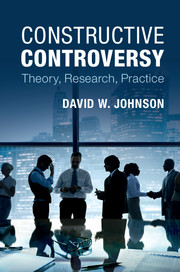Book contents
- Frontmatter
- Contents
- List of figures
- List of tables
- Acknowledgments
- 1 Underlying foundations of constructive controversy
- 2 The nature of constructive controversy
- 3 Theory of constructive controversy
- 4 The processes of constructive controversy and concurrence seeking
- 5 The outcomes of constructive controversy
- 6 Conditions mediating the effects of constructive controversy
- 7 Constructive controversy and decision making
- 8 Constructive controversy in education
- 9 Constructive controversy and political discourse in democracies
- 10 Constructive controversy, creativity, and innovation
- 11 Constructive controversy and building and maintaining peace
- 12 Conclusions
- References
- Index
2 - The nature of constructive controversy
Published online by Cambridge University Press: 05 June 2015
- Frontmatter
- Contents
- List of figures
- List of tables
- Acknowledgments
- 1 Underlying foundations of constructive controversy
- 2 The nature of constructive controversy
- 3 Theory of constructive controversy
- 4 The processes of constructive controversy and concurrence seeking
- 5 The outcomes of constructive controversy
- 6 Conditions mediating the effects of constructive controversy
- 7 Constructive controversy and decision making
- 8 Constructive controversy in education
- 9 Constructive controversy and political discourse in democracies
- 10 Constructive controversy, creativity, and innovation
- 11 Constructive controversy and building and maintaining peace
- 12 Conclusions
- References
- Index
Summary
INTRODUCTION
“Listen to me!” shouted Member A of a metro commission in charge of planning for suburban expansion. “Urban sprawl destroys more than one million acres (about the size of Rhode Island) of parks, farms, and open space every year. We do not want to turn more productive farmland as well as cherished parks and open spaces into strip malls, freeways, and houses that only the rich can afford! We have to limit suburban expansion!”
“Nonsense,” replied Member B of the commission. “The population of Metro City keeps growing. Unless we develop the suburbs, large numbers of people are going to be forced to live in the same small area. The only way to prevent such overcrowding is to expand the suburbs. In addition, people get much more use out of houses and backyards than they do out of farmland, wetlands, or parks. Let's maximize the use of this land!”
“Look,” replied Member A. “It isn't just land use. The more people who live in the suburbs, the more highways, sewage lines, phone lines, electrical lines, and so forth we need. Suburbs cost a lot of money. In addition, they steal jobs from the city, as malls are built far away from the city and businesses move to be nearer their customers. Expanding the suburbs is not a good idea.”
“That may not be up to us,” Member B commented. “If a farmer is planning to retire and he can sell his land to a developer at a price far above what it is worth as farmland, how do we stop him? Do we have the right to stop him? By the way, when population densities of cities go up and no new roads are built, the only possibility is that traffic will get worse.”
This conversation continued through several meetings, until a decision was made as to how much suburb expansion the commission would recommend. Members’ confidence in their decision was high due to the vigorous arguing of both sides of the issue.
- Type
- Chapter
- Information
- Constructive ControversyTheory, Research, Practice, pp. 21 - 28Publisher: Cambridge University PressPrint publication year: 2015
- 1
- Cited by

